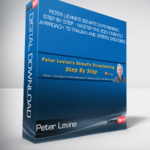Description
Peter Levine’s Somatic Experiencing, Step by Step – Master the Body-oriented Approach to Trauma and Stress Disorders

Discover Somatic Experiencing: A life-changing approach to healing that unlocks the change within the client.
When clients have experienced traumatic events, no matter how long ago, they often carry the fragmented remnants—and the accompanying feelings of helplessness, fear, pain, and anxiety—deep in their bodies, beyond the reach of most talk therapy. For many therapists, helping these clients change complex, deeply entrenched responses can be frustrating work—especially after their best clinical efforts fail to bring about the healing these clients so desperately need.
Fortunately, trauma treatment innovator Peter Levine, after 50 years of research and clinical work, shares that the key to helping your client heal is not changing them, but working with their bodies to reveal the change within. That’s why he developed Somatic Experiencing (SE), an approach that taps into the power of psychological and physical cues to serve as a client’s unique guide to effective, long-lasting healing.
Now, in this groundbreaking Master Class, see Somatic Experiencing in action through powerful in-session videos and in-depth, therapist-to-therapist, conversations. You’ll get an inside understanding of the transformative SE approach by watching Levine demonstrate the essential techniques with three actual clients dealing with deep-rooted trauma, attachment wounds, shame, and chronic pain. Then join Networker editor Rich Simon as he sits down with Levine to take a deep dive into the nuts-and-bolts of each session, with thought-provoking questions that get to the heart of the SE techniques so you can learn to implement them into your own work.
Don’t miss this opportunity to experience Somatic Experiencing’s ability to dramatically improve outcomes—even with the most challenging cases.
What’s Included:
Combine Bottom-Up and Top-Down Approaches for Better Outcomes
Dramatic clinical demonstrations with in-depth analysis by Peter Levine and fellow psychotherapist Rich Simon make this revolutionary Master Class an essential learning experience for skilled therapists eager to bring a new dimension of healing to their current therapeutic approach. These sessions showcase the clinical mastery of Levine and demonstrate SE’s singular approach to working with trauma, attachment injuries, chronic pain, and sexual abuse.Through this engaging course, you’ll learn:
- A step-by-step process for helping clients safely release the traumatic stress that interferes with their ability to engage in therapy
- Simple interventions based on movement, images, breathing and vocalizations for creating new experiences in the body that displace negative emotions, such as shame, powerlessness, and low self-esteem
- How to read the body’s clues to a client’s underlying emotional state
- Strategies for helping clients access and release suppressed emotion in controlled and empowering ways
- Proven exercises that help clients connect with their bodies and gain confidence from the physical experiences of power, mastery and independent agency
- Tools for working with clients who can’t access memories of a traumatic event or who shut down when it comes to talking about intense emotion
Levine will guide you through these four modules to fully prepare you to incorporate the SE approach in your practice.
Working with What the Body Knows: Introduction to Somatic Experiencing
Join Peter Levine in this introductory session for a comprehensive breakdown of how SE can help clients release traumatic stress, overcome negative emotions such as shame and anxiety, and allow their nervous systems to find balance so they’re more receptive to therapeutic intervention. In preparation for the powerful clinical demos in the upcoming modules, Levine breaks down the SE model, step-by-step, to help you discover how its “bottom-up first” approach can be the key to lasting healing for your clients.
Addressing the Emotional Roots of Physical Pain
Meet TJ, a man who’s been suffering from intractable chronic pain for seven years. Watch as Levine quickly picks up on physical cues in TJ’s body, including rigidity in his spine, change of skin color, and quickening of the pulse as cues to what’s encumbering him. Relying on the “unspoken language” of the client’s body, Levine guides him through an imaging exercise that leads to the release of traumatic stress and an emotional breakthrough. The work continues in well-modulated steps that result in significant reduction of pain for TJ—despite there being little discussion about the pain itself and no pain-specific interventions or physical manipulation applied during the session.
Releasing the Body from the Bonds of Trauma: A Somatic Approach to Healing Abandonment Issues and Attachment Wounds
In this session, Navid has come to Levine for help with issues of self-sabotage in his work and personal life. Levine immediately tunes into Navid’s physical demeanor—his rigid shoulders, collapsed middle and compressed spine—for indications of suppressed emotion and shame. He develops the hypothesis that Navid’s trauma is rooted in attachment wounds and separation panic, and with that awareness, he guides Navid through healing exercises that help to channel anger in a healthy way, relieve stress, and bring about new experiences of lightness and aliveness by reconnecting him with the wounded child inside. This session is filled with simple techniques and moving demonstrations of SE’s power to not only help heal trauma, but also repair attachment injuries and move through developmental plateaus.
Bottom-Up Healing for Childhood Sexual Abuse
Jenny is a client with a history of traumas that includes suffering from long-term sexual abuse by an older brother. Levine’s work with Jenny is orderly and focused on her being in control, to help counter her feelings of helplessness, a result of the abuse. After a series of specific SE interventions, Jenny develops a new physical demeanor that neutralizes her initial shame. With Levine’s guidance, she explores her ability to claim and maintain her personal boundaries, and then in a very powerful moment in the session, he helps her close the cycle of early trauma with guided imagery.

Peter A. Levine, Ph.D., holds doctorates in both medical biophysics and psychology. The developer of Somatic Experiencing®, a body-awareness approach to healing trauma, and founder of the Somatic Experiencing Trauma Institute, which conducts trainings in this work throughout the world and in various indigenous cultures, with 26 faculty members and over five thousand students. Dr. Levine was a stress consultant for NASA on the development of the space shuttle project and was a member of the Institute of World Affairs Task Force of Psychologists for Social Responsibility in developing responses to large-scale disasters and ethno-political warfare. Levine’s international best seller, Waking the Tiger: Healing Trauma, has been translated into 22 languages. His recent interests include the prevention of trauma in children, and he has co-written two books, with Maggie Kline, in this area: Trauma Through a Child’s Eyes and Trauma-Proofing Your Kids. His most recent book: Trauma and Memory: Brain and Body in a Search for the Living Past, was recently released to rave reviews. Levine’s original contribution to the field of body psychotherapy was honored in 2010 when he received the Lifetime Achievement award from the United States Association for Body Psychotherapy (USABP).
Speaker Disclosures:
Financial: Peter Levine is the Developer of Somatic Experiencing®. He is the founder and Senior Advisor to the Foundation for Human Enrichment; and Senior Advisor to The Meadows Addiction Treatment Center. Dr. Levine receives a speaking honorarium from PESI, Inc.
Non-financial: Peter Levine is a member of the American Psychological Association; Humanistic Psychological Association; and International Society for Traumatic Stress Studies.
Get Digital Download ” Peter Levine’s Somatic Experiencing, Step by Step – Master the Body-oriented Approach to Trauma and Stress Disorders ” Right Now!









Reviews
There are no reviews yet.